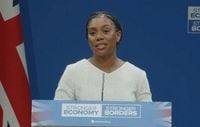From October 5 to 8, 2025, the Conservative Party gathered in Manchester for its annual conference—a ritual that, in years past, might have set the British political agenda. But this year, the mood around the Midland Hotel and the conference center was unmistakably different. Attendees, lobbyists, and even seasoned journalists seemed to share a collective sense of bewilderment: what, exactly, was the point of it all?
The conference’s centerpiece, a ‘Thatcher at 100’ reception, was intended to celebrate the legacy of Margaret Thatcher, the Iron Lady who once symbolized Conservative dominance. Instead, the event seemed to highlight just how far the party has fallen from those heady days. According to communist.red, the gathering was “a pathetic attempt to nostalgically recall ‘the good old days’ – whilst turning a blind-eye to the reality of the crises facing the country.” The symbolism was hard to miss: a once-mighty warship, now decrepit, being tugged away to the scrapyard.
Empty seats were a recurring motif throughout the four-day event. One session on free speech drew just 55 people, as reported by Max Kendix on X (formerly Twitter). Lobbyists and public affairs professionals, usually a fixture of such events, found themselves wandering the exhibition hall in search of meaningful engagement. As POLITICO described it, “the atmosphere was quite flat.” One industry veteran even admitted to spending Monday morning on a round-trip to Liverpool to retrieve a forgotten coat rather than network in Manchester.
Behind the scenes, the party’s woes were multiplying. In the days leading up to and during the conference, defections to Nigel Farage’s Reform UK party accelerated. Eleven Conservative MPs—including high-profile names like Nadine Dorris, Danny Kruger, Maria Caulfield, and Henry Smith—had jumped ship since the 2024 general election. On October 7, Farage announced that 20 Tory councillors had defected to Reform UK, crowing on social media, “The Conservative Party is finished.”
The sense of crisis was not lost on the party’s leadership. In her first conference speech as party leader, Kemi Badenoch sought to rally the faithful by pledging to return to “the same timeless Conservative principles” that once made the party an election-winning machine. She slammed Labour Prime Minister Keir Starmer as “weak” and “useless,” but notably sidestepped direct confrontation with Reform UK, whose surge in the polls is now an existential threat to the Tories. Political scientist Robert Ford, quoted by AFP, put it bluntly: “It is existential. On the current numbers, you’ll be able to fit Conservative MPs into a small coach after the next election.”
Badenoch’s policy announcements were ambitious, if familiar: slashing the UK’s deficit, radically reforming the welfare system, cutting stamp duty, and most controversially, pledging to leave the European Convention on Human Rights and deport 150,000 irregular migrants a year. These moves were widely seen as attempts to claw back support from Reform UK, led by the ever-polarizing Nigel Farage. Yet, as Tim Bale, professor of politics at Queen Mary University of London, told AFP, “They made all sorts of promises on immigration and the economy, which they didn’t deliver on in government.”
The numbers tell a sobering story. The 2024 general election saw the Conservatives reduced to just 121 MPs in Britain’s 650-seat parliament—their worst defeat ever. A recent YouGov poll found that if an election were held now, the party could be reduced to just 45 MPs, placing it fourth behind the Liberal Democrats and Reform UK. In such a scenario, Farage could even ask the Tories to become a junior partner in a governing coalition, a prospect that Ford likened to “a black widow spider effect. You mate with the larger one and it eats you.”
Despite the gloom, some within the party and the business community tried to put on a brave face. Conservative MP Martin Vickers told AFP that the polls could “change dramatically,” while 24-year-old councillor Ralph Muncer expressed confidence that the party could “bounce back.” On the conference floor, shadow ministers and select committee members managed to draw respectable crowds at fringe events, with public affairs professionals noting that they were “very much in listening mode, while also keen to reaffirm some fundamental (to Tories) principles as they looked to reassure members and business that they have a pathway to power again in the future,” as Verity Barton of Instinctif Partners told POLITICO.
Business engagement, however, was a mixed bag. Corporate stands were sparse, and the much-touted Business Day event—originally priced at £3,500—had to be heavily discounted as the conference approached. Some sectors, particularly those involved in clean energy, voiced frustration at the party’s apparent disavowal of its own record. Pablo John, head of external affairs at the ADE, remarked that the Conservatives discussed energy in Manchester as if “Ed Miliband had been ruling the country with an iron fist since 2015.”
Still, there were moments of levity. The conference’s social gatherings, including the POLITICO Pub, saw attendees consume hundreds of pints of beer and glasses of wine—a testament, perhaps, to the British instinct for finding comfort in camaraderie during uncertain times. And for those who stuck around, there was even the chance for second helpings of a particularly good chocolate pudding, thanks to the empty seats.
Yet, the underlying anxiety was impossible to ignore. As one senior in-house professional put it, “There’s still a lot of talent and experience among the upper echelons. No one believes they’ll reach the election in the same roles, but most will remain in senior positions, so it was useful to set out our stall now.”
Looking ahead, the Conservative Party faces a daunting road. The next general election is expected in 2029, but with Reform UK dominating the polls and the airwaves, many around Westminster are already speculating about the longevity of Badenoch’s leadership. “The hole they’re in is way, way deeper than any hole they’ve been in for a century or so,” said Tim Bale.
For now, the Tories seem caught between nostalgia for their storied past and the hard realities of a rapidly shifting political landscape. Whether they can adapt—and survive—in the face of these challenges remains the question on everyone’s mind.





